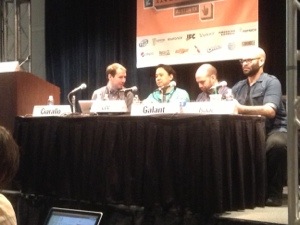To tweet a source, or not to tweet a source, that is the question. In the age of an overwhelming number of social media platforms the panel, Souces in the Social Media Age discussed the relationship between sources and social media. The panelists included Edmund Lee from Bloomberg news. Greg Galant, creator of Muck Rack and Mike Issac from All Things D.
A journalists goal is to get the best source before any of their competitors do. Social media tools allow for this first response to happen sooner. Finding someone through online sources has become very effective. However, there are stil debates to this method. Issac finds that talking in person is much more compelling in terms of sourcing. “Although this can be polarizing, I don’t want to pull it {the information} out just because it’s there.”
Social media has also been useful when journalists want to talk to someone who is hard to contact. “If I call them and am unable to talk to them I go to Twitter to see if they tweet something that is relevant,” said Lee. “But I always call them first.”
It’s clear that technology has changed many things in recent years. “Journalists used to apologize for being on Twitter, now they apologize for not being on it,” said Galant.
So which medium should journalists choose? There are certain circumstances where a source will provide more information digitally, but other times when a personal connection is important. “We, as journalists, like to believe our special art is our ability to coax a source,” said Lee. Being successful at this art usually equates to the personal connection. However, Lee also pointed out that there is sometimes a weird magic that happens when talking to sources on social media platforms.
Galant wrapped up the personal vs social media discussion by comparing social media to craigslist. “Social media is a craigslist for sources in the sense that the transaction may start online, but he transaction isn’t complete here, you have to do the rest in person.”


Permalink
I completely agree with all the points Galant made about social media. They are tools that contribute to an end goal for people in communications, but they do not replace all other tactics. Social media certainly make it easier to connect with people you never would have met otherwise, communicate messages to a much larger and more diverse audience, and interact on a personal level without actually meeting someone in person. However, there is a level of personal connection that cannot be met online. Like Galant said, a connection may start online for him, but he has to do the rest in person. Talking to a source in person, or at least over the phone, helps extrapolate details that cannot be had from a 140-character tweet. The personal interaction is absolutely necessary to develop an in-depth and complete story. Sounds like it was a great panel!